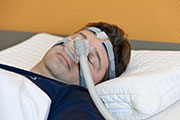- Could Your Grocery Store Meat Be Causing Recurring UTIs?
- Are You Making This Expensive Thermostat Error This Winter?
- Recognizing the Signs of Hypothyroidism
- 10 Strategies to Overcome Insomnia
- Could Artificial Sweeteners Be Aging the Brain Faster?
- Techniques for Soothing Your Nervous System
- Does the Water in Your House Smell Funny? Here’s Why
- Can a Daily Dose of Apple Cider Vinegar Actually Aid Weight Loss?
- 6 Health Beverages That Can Actually Spike Your Blood Sugar
- Treatment Options for Social Anxiety Disorder
Treating Sleep Apnea May Help Those With Heart Rhythm Disorder


People with both atrial fibrillation and obstructive sleep apnea are less likely to have a recurrence of the heart rhythm disorder if they use continuous positive airway pressure (CPAP) therapy, a new report says.
Researchers from New York University Langone Medical Center reviewed seven studies that included more than 1,000 people with sleep apnea. They found that CPAP use was associated with a 58 percent reduction in the recurrence of atrial fibrillation, an irregular, often rapid, heart rate.
“Active screening for obstructive sleep apnea in all patients who undergo treatment for atrial fibrillation is imperative as the use of CPAP will influence the outcome of therapy and likely reduce some of the cardiovascular morbidity associated with atrial fibrillation,” said Dr. Larry Chinitz, a professor of medicine and cardiac electrophysiology.
The results were published April 20 in the Journal of the American College of Cardiology: Clinical Electrophysiology.
A large randomized clinical trial needs to be conducted, but these findings suggest CPAP shows promise as another treatment option for atrial fibrillation, the researchers said.
“Our study confirms the expanding body of evidence that treatment of modifiable risk factors has a significant impact on the long-term suppression of atrial fibrillation regardless of the type of therapy offered,” Chinitz said in a journal news release.
Sleep apnea is a potentially serious sleep disorder involving disrupted breathing. Patients with sleep apnea are often prescribed CPAP therapy, in which a small machine and mask provide steady air pressure throughout the night.
“Technology for home screening of sleep apnea needs to be made widely available and become as routine as measurements of blood pressure and blood sugar levels in diabetics,” Chinitz added.
Sleep apnea and several other conditions, including hypertension, obesity and diabetes, contribute to the onset and progression of atrial fibrillation, journal editor-in-chief Dr. David Wilber said in the news release.
“This study provides important evidence that we need to identify and treat these associated conditions if our more direct efforts to suppress the arrhythmia by antiarrhythmic drugs or ablation are to be effective,” Wilber added. (Ablation involves threading a catheter from the groin to the heart to correct the heart rhythm abnormality).
More information
The U.S. National Heart, Lung, and Blood Institute has more about atrial fibrillation.
Source: HealthDay
Copyright © 2026 HealthDay. All rights reserved.










